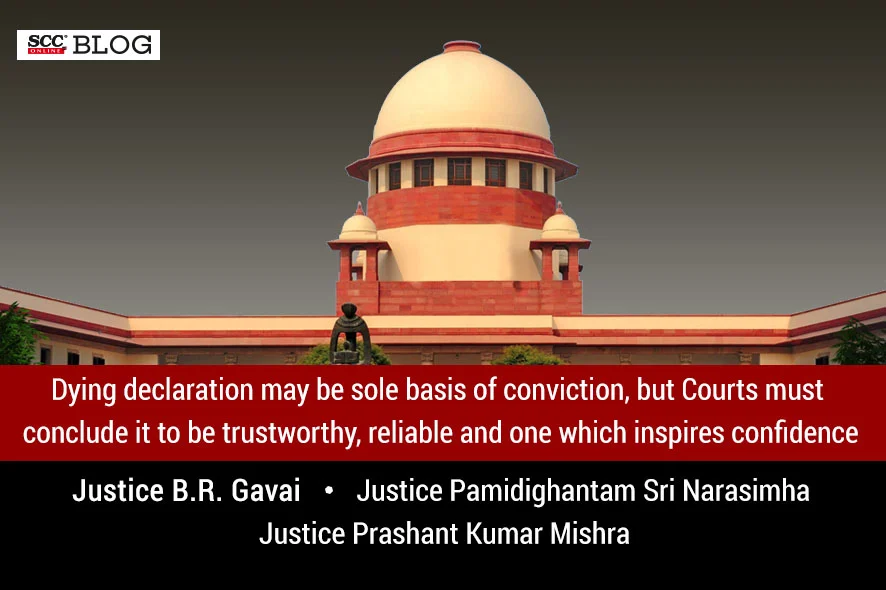Supreme Court: In an appeal challenging judgment and order passed by the Division Bench of Punjab and Haryana High Court on 24-07-2009 wherein, the appellant’s father was acquitted of charge under Section 304-B of Penal Code, 1860 (‘IPC’), but the conviction and sentence against the appellant was upheld for the same offence and revision petition against his acquittal for charge under Section 302 IPC was dismissed, the Bench of B.R. Gavai*, Pamidighantam Sri Narasimha and Prashant Kumar Mishra, JJ. acquitted the appellant expressing ‘grave doubt’ on whether the dying declaration recorded by the Executive Magistrate was a voluntary one or tutored at the instance of another.
Facts
The deceased and the appellant got married in March 1987 and were blessed with a girl and a boy. The case involves allegations of harassment in lieu of dowry demands, leading to death of the deceased after suffering 91% burns, leaving behind a dying declaration finger pointing at the appellant. Information regarding death was received at the police station on 18-11-1991, the case was committed to the Sessions Court and charges were framed under Sections 302 read with Sections 34 and 304-B of IPC against the father-in-law, mother-in-law and husband/appellant.
The Trial Court convicted all three of the accused persons for offence under Section 304-B of IPC for causing dowry death of the deceased but accorded benefit of doubt for charge under Section 302 of IPC. In appeal before the High Court, both conviction and acquittal were challenged by the accused persons and the State respectively. The mother-in-law had died during the proceedings, the High Court acquitted the father-in-law for charge under Section 304-B of IPC, but confirmed the conviction and sentence against the appellant, which was appealed against in the instant matter.
Court’s Analysis of IPC 304-B Dying Declaration
The Court acknowledged that the instant case rested on the deceased’s dying declaration, which could be the sole basis of conviction, but “the court must come to a conclusion that the dying declaration is trustworthy, reliable and one which inspires confidence.”. The Court highlighted that the dying declaration in the instant matter was recorded by the Executive Magistrate, who stated to have obtained doctor’s certificate regarding deceased’s fitness for making such statement, which was also read over and explained to the deceased who in turn admitted its correctness.
The deceased in the dying declaration had stated that on 5-11-1991, her husband, father-in-law and mother-in-law caught hold of her, her husband put kerosene on her and set her ablaze. She raised an alarm but they overpowered her. The Court went on to the fact that the burn incident took place on 5-11-1991, but the deceased’s statement was recorded on 8-11-1991 and that the Executive Magistrate had admitted that the boys who accompanied him informed of having told the deceased whatever they had to tell her, who were all related to her.
Doubts on Dying Declaration
Therefore, the Court hinted towards ‘grave doubt’ on whether the dying declaration recorded by the Executive Magistrate was a voluntary one or tutored at the instance of another. It further pointed towards the Doctor’s statement who highlighted in his statement that the dying declaration was recorded at 4:40 pm, while the opinion regarding the deceased’s fitness was given at 6 pm, which raised doubts on whether the Doctor actually examined the deceased for fitness prior to recording statement. In addition, the Doctor stated that the history recorded by him was narrated by the deceased herself, who had also mentioned about her husband extinguishing the fire by pouring water on her.
Considering the circumstances in totality, the Court said that the dying declaration was not free from doubt. It further highlighted that the High Court itself disbelieved the dying declaration as far as the father-in-law was concerned, but questioned the same dying declaration being made the basis of appellant’s conviction in so far as the same was disbelieved for another accused. The Court then pointed towards the deposition of ASI concluding that it was not a case under Section 307 and 498-A of IPC but one under IPC Section 309, which was also verified and agreed to by the higher authorities.
Regarding evidence of harassment on account of non-fulfillment of demand of dowry, the Court expressed that the deceased’s father and brother being her relatives, “their evidence will have to be scrutinized with greater care, caution and circumspection”, and there was nothing in their evidence except for vague allegation, while the village Sarpanch was himself informed by the deceased’s father regarding harassment.
The Court viewed that there was no evidence to prove beyond reasonable doubt that the deceased was harassed on account of non-fulfillment of demand of dowry and stated that no case was made out by the prosecution under Section 304-B of IPC. Therefore, the Court allowed the instant appeal, quashed and set aside the impugned judgment and order of conviction, acquitting the appellant of all charges levelled against him.
[Phulel Singh v. State of Harayana, 2023 SCC OnLine SC 1227, decided on 27-09-2023]
Judgment authored by: Justice B.R. Gavai
Advocates who appeared in this case :
For Appellant: Advocate on Record T. L. Garg
For Respondent: Advocate on Record Samar Vijay Singh, Additional Advocate General Raj Singh Rana, Advocate Pankaj Kumar Singh, Advocate Keshav Mittal, Advocate Sabarni Som, Advocate Aman Dev Sharma








